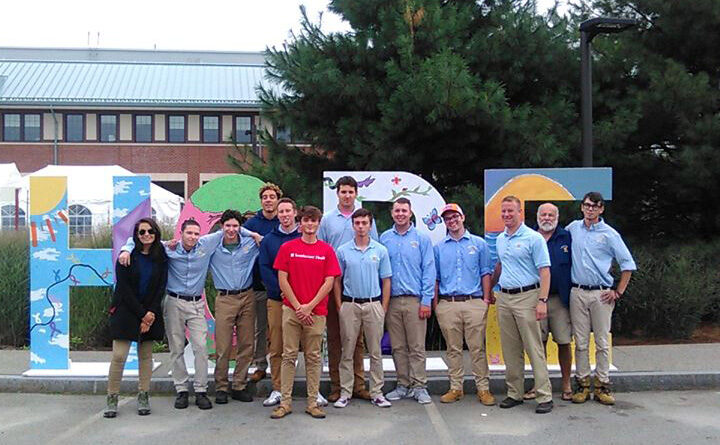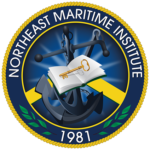Associate Degree Program
Nautical Science Degree Program
The Associate in Applied Science in Nautical Science degree program provides a fast-track to a career in the maritime industry. Dually approved by the U.S. Coast Guard and Commonwealth of Dominica Maritime Administration for professional licensing, the program provides the necessary nautical science knowledge with extensive opportunities for hands-on practical experiences using our training vessels, equipment and full bridge simulators.
The program is delivered as an on-campus small group, cohort style of education, with some courses being delivered through distance education delivery methods. Class and lab sizes are capped at sixteen students and practical boat sessions maintain maximum instructor to student ratios of 1:16. Each cohort develops as a unit; learning, studying and working together, preparing for a future working and living on-board ships. Students will be transformed into a cohesive group, learning from one another, while developing the individual skills necessary to enter the maritime industry. Two summer semester externships provide real world experience and opportunities to build professional relationships in the industry, while accumulating sea time towards a maritime license.
Graduates leave the program with 78 credits of general education and nautical science courses as well as completion of the required professional licensing examinations on campus. Additionally, graduates leave with an extensive list of license endorsements and recognized training to easily navigate upward in the industry.
Program Objectives
Preparing students for careers as licensed deck officers on vessels in the maritime industry, meeting both U.S. domestic license requirements as well as international requirements. The program also includes a strong focus on personal responsibility, honesty and integrity to support the development of a well-rounded graduate who is prepared to support the safe operation of their vessel. Students obtain the necessary theoretical knowledge, practical skills and competencies through a comprehensive applied two-year program which includes two summer externship experiences to further develop occupational skills and to gain shipboard experience.
The overall student learning outcomes for the Nautical Science program:
- To realize a high level theoretical knowledge, experience, professional competencies and proficient skill sets required and set forth by the U.S. Coast Guard National Maritime Center licensing and assessment guidelines essential for the Master 100 Gross Tons/Mate 200 Gross Tons, Near Coastal License and Officer in Charge of a Navigational Watch less than 500 Gross Tons STCW endorsement level (required academic, professional and occupational skills) as well as those associated competencies set forth by the International Maritime Organization’s Standards of Training and Certification for Watchkeepers, 1995, as amended. These include: seamanship, navigation, watchkeeping, maritime safety, maritime security, pollution prevention & environmental protection, leadership, critical thinking and ethical decision making.
- To realize a strong sense of work ethic while performing ones duties with honesty and integrity and personal responsibility.
Course Descriptions
Maritime Courses
This course is a self-directed study and writing course integrated into the shipboard life of the student during their first summer semester externships. Students will maintain a daily journal in a narrative format of their vessel experiences including: vessel trading routes, daily routines and duties, significant accomplishments and acquired skills, problems or obstacles that they overcame. The journal is a “log” of general information as well as a forum for self-reflection. Students will also write a final essay on their externship experience.
Prerequisite: EN 101 or EN 102
Credits: 1
This course is a self-directed study and writing course integrated into the shipboard life of the student during their first summer semester externships. Students will maintain a daily journal in a narrative format of their vessel experiences including: vessel trading routes, daily routines and duties, significant accomplishments and acquired skills, problems or obstacles that they overcame. The journal is a “log” of general information as well as a forum for self-reflection. Students will also write a final essay on their externship experience.
Prerequisite: EN 101 or EN 102
Credits: 1
This course will introduce students to the engineering science of elementary thermodynamics, lubrication theory and practice and systems of measurement. The class is designed to teach the purpose of pumps, filters, strainers, valves, piping and fittings as it applies to the marine metallurgy and basic main propulsion and auxiliary diesel machinery.
Prerequisite: None
Credits: 3
This course introduces students to the basic construction and stability of ships. Topics addressed include: hull forms, ship structures, hull girder strength, and local strength; ship construction and repair; trim and stability calculations and the effects of leading; the principles of intact and damage stability; flooding de-watering, and damage control; and international and United States regulations for the prevention of Pollution and their impact on ship design and construction.
Prerequisite: MT 107 Technical Mathematics
Credits: 3
This course provides students with the basic knowledge and training of personal survival techniques needed to react appropriately during emergency situations, taking suitable measures for their survival and survival of others and how to use survival equipment correctly. Additionally, course material covers the knowledge of personal safety and social responsibilities as it relates to living and working aboard operational merchant ships, basic instruction in elementary first aid and CPR techniques and how to respond and perform those skills in an emergency. The course is also designed to include the basic firefighting that gives the student necessary skills to react appropriately in the event of a fire aboard ship, control the firefighting operations, the knowledge on the theory and science of fire, methods of firefighting and firefighting equipment, along with fire preventions and the ability to inspect and maintain the fire extinguishing systems.
Prerequisite: None
Credits: 3
This course will take place during the student internship onboard a vessel for the summer at sea service. The student will be responsible to complete the Summer Sea Service Packet (Training Record Book) and return with the requisite completion of ship board tasks. The student will be required to complete this coursework during their first summer term at sea.
Prerequisite: None
Credits: 3
This course is a study of the laws for the prevention of collisions at sea, the identification of navigational aids and the introduction to maritime pollution prevention laws and practices. Topics will include marlinspike seamanship, the theory and practice of cargo and weight handling, and the use of lines aboard ship will be enlisted both theoretically and practically. The course will be taught with a combination of classroom lectures and hands on laboratory experience.
Prerequisite: None
Credits: 3
This course provides the student with a comprehensive study of deck and marlinspike seamanship. It will provide the necessary background and knowledge concerning the requirements and duties of a lifeboatman.
Prerequisite: NS 103 Nautical Science
Credits: 3
This course introduces the student to the international and inland laws and rules for the prevention of collision at sea. The class will study the navigation safety regulations of 33 Code of Federal Regulation 164 which will cover the required lights, shapes, and sound signals. Case studies are used to provide an understanding of the rules and their application in real life situations and a better understanding of the historic consequences of improper application.
Prerequisite: None
Credits: 3
This course is an introduction to the basic ship handling and control systems. It will introduce the student to the science and art of controlling, maneuvering of the single and twin screw power vessels, and tug and barge combinations in light and loaded conditions using the Northeastern Maritime Institute’s simulators.
Prerequisite: NS 103 Nautical Science
Credits: 3
The student will be provided with an introduction into coastal navigation by addressing navigational charting systems, use of magnetic and gyro compasses, compass error, course plotting dead reckoning, visual navigation, aids to navigation, and nautical publications. Additionally, the course will include the computation of tides and tidal currents and their effect on navigation.
Prerequisite: MT 107 Technical Mathematics
Credits: 3
This course will address the theory and practice of navigation with electronics including navigation software, GPS and radio direction finder. Emphasis is placed on assessing the accuracy of electronic navigation. The marine gyro compass theory, operation, maintenance, and sources of error associated with the use of electronic charting systems (ECDIS) are also major emphases of the course.
Prerequisite: NS 201 Terrestrial Navigation
Credits: 3
This course will introduce the student to the fundamentals of bridge resource management and its role in the safe navigation of the vessel. The Bridge Resource Management Course covers the following subjects: Situational Awareness and the Error Chain, Passage Planning, Watch Keeping, Bridge Emergencies, the Master-Pilot Relationship, Leadership, Communications, and Management of Stress and Fatigue. Students will have the opportunity to create a voyage plan and complete it on the full bridge simulator.
Prerequisite: None
Credits: 3
This course will take place during the student’s Summer at Sea onboard a vessel, while accumulating sea service. The student will be responsible for completing the Summer at Sea Service packet (Training Record Book) and return with the requisite completion of shipboard tasks. The student will be required to complete this coursework during their second summer term at sea.
Prerequisite: NS 102 STCW Navigational Watch I
Credits: 2
This course will introduce the student to the theory, operation, and maintenance of shipboard RADAR. Included will be an in-depth study of the application of radar in collision-avoidance and navigation at sea with a special emphasis on the performance limitations and environmental effects on radar. The principles of radar navigation will be studied, and the student will develop both the mental and manual skills needed to safely use radar in a real time marine environment. Concurrent with NS 201 Terrestrial Navigation and Bridge Resource Management.
Prerequisite: None
Credits: 3
The student will be introduced to the tanker and tank barge regulations and operations, which include areas such as flammable and combustible liquids, tank vessel safety, cargo piping, and pumping systems, tank cleaning, gas free operations, ballast, loading, off-loading and dangerous/hazardous cargo. Environmental and pollution regulations will also be discussed along with oil pollution clean-up theory and practice.
Prerequisite: None
Credits: 3
This course will introduce the student to towing boat safety and operational procedures fundamentals. Such topics will include the proper safety line handling requirements of towing, review and define the safety considerations and the procedures for facing/unfacing the boat during towing. Additionally, it will review the procedures for working with rigging, daily inspection and maintenance of the tow and the boat, and the safety procedures of equipment for making a lock as well as the judgment involving distance calling.
Prerequisite: NS131 Intro to Shiphandling
Credits: 3
This course is an introduction to meteorology with special emphasis on weather at sea. It will include the atmospheric composition, general circulation, frontal systems, wind, moisture, atmospheric stability, storm systems, weather observations, satellite images, forecasting and weather information at sea and ship routing.
Prerequisite: None
Credits: 3
This course provides the necessary skills needed to acquire knowledge to complete the 200T Captain’s License Exam.
Prerequisite: None
Credits: 3
This course introduces the student to the safe navigation of sail vessels, the practical application of sailing techniques in collision avoidance, docking, anchoring, and sailing under power. The course also includes all of the United States Coast Guard requirements for and Auxiliary Sail endorsement.
Prerequisite: None
Credits: 3
The course will introduce the student to the components of ocean voyaging as well as vessel management concepts and activities. The course brings together previously learned topics from Terrestrial Navigation, RADAR as students prepare a complete ocean voyage plan incorporating international regulations and requirements and necessary vessel management activities.
Prerequisite: NS 201 Terrestrial Navigation, NS 208 Radar and ARPA
Credits: 3
General Education Courses
This course will introduce the student to writing about subjects from his/her own experience and/or critical interpretation of selected readings. The student will learn how to work cooperatively within a small group to design, draft, deliver, conduct research and share their research and written papers with the class.
Prerequisite: None
Credits: 3
This course is an introduction to the study of maritime literature, which includes nonfiction and fiction. Students will be encouraged to respond actively to the literary works through class discussion and a variety of writings by analyzing, describing, and critiquing maritime literature.
Prerequisite: ENG 101 Critical Writing
Credits: 3
This course provides instruction and experience in preparation and delivery of speeches within a public setting and group discussion. Emphasis is on research, preparation, delivery, and evaluation of informative, persuasive, and special occasion public speaking. Upon completion, students should be able to prepare and deliver well-organized speeches and participate in group discussion with appropriate audiovisual support. Students should also demonstrate the speaking, listening, and interpersonal skills necessary to be effective communicators in academic settings, in the workplace, and in the community.
Prerequisite: None
Credits: 1
This course provides students with necessary mathematical background for related courses in physics and navigation and provides students with the precalculus they may need when continuing their studies beyond an associate degree. Topics include algebra concepts such as solving linear and quadratic equations, trigonometric concepts including basic definitions, solving right and oblique triangles. Also included will be the study of exponential and functions. In all these areas, emphasis will be placed on calculation and graphing.
Prerequisite: None
Credits: 3
This course provides an interdisciplinary introduction to the fundamental principles and processes that govern the science of oceanography. Because of oceanography’s interdisciplinary nature, we will examine geological, physical, chemical, and biological processes as they apply to the ocean. This will include studies of plate tectonics, circulation, waves, tides, and various aspects of marine biology and ecology relative to how the oceans support living ecosystems. Topics will include ocean biology, sea water chemistry, and weather. Students will have hands-on exposure to sampling methods and gathering samples to study living organisms in the ocean.
Prerequisite: None
Credits: 3
Students will be introduced to an integrated view of how the basic concepts of physics are applied to mechanical, fluidal, electrical and thermal systems. The course is designed to teach physics as: the study of how motion occurs, how to identify and measure force-like quantities, describe the concept of resistance, and define electrical transformers and the three basic machines. This course also includes a weekly lab session.
Prerequisite: MTH 107 Technical Mathematics
Credits: 4
This course will introduce the student to the constitutional, ideological and cultural factors that influence the political and governmental institutions of the United States. It will describe the structure and functions of the United States and Massachusetts Government Constitutions, the mass media and public opinion, voting and elections, the institutions of national government, and the constitutional Liberties and rights of citizens. The course aids students in their efforts to understand the responsibilities and rights of the individual in human society.
Prerequisite: None
Credits: 3
This course will examine the geographical documentation of the coasts and inland waterways of North America from the viewpoint of commercial use, the settlement and growth of seaports, and the relationship of those seaports to regional natural resources, trade, and later industrial development. It will cover a broad swath of the American maritime experience from the first European explorers to document coastal New England, to the great achievement of The Atlantic Neptune set of sea charts, to American contributions to the art and practice of navigation and cartography in the early 19th century. It will include the socio-political structures of the colonial era such as laws and regulation, the ongoing improvements in aids to navigation, shipbuilding, timber resources, fishing, whaling, the triangle trade, regional overseas trade specialties, coastal voyages, the slave-driven economy, and the growth of the U.S. Navy. Additional subjects include the ultimate contributions of American mariners to world exploration, oceanic cartography, and hydrography.
Prerequisite: None
Credits: 3
This course is designed to introduce the student to the fundamentals and types of leadership, the concepts of ethics and ethical decision making. Topics include management skills; promoting workplace vision, strategy and mission; ethical decision-making; accountability and trust.
Prerequisite: None
Credits: 3
Other Courses
This pass/fail course will provide students with access to personal skills needed to be successful, both in school and on the job. Students will learn how to set goals and create a plan to reach them, time management, and study skills. They will learn how to access and use online resources as well as traditional library resources. Elements of teamwork and leadership will also be incorporated into the class as part of the USCG requirements.
Prerequisite: None
Credits: 0

Involved in the Community
Community Service
At Northeast Maritime Institute, our motto is “Honor the Mariner”. We encourage all of our students to give back some of their time by providing service to others with integrity and pride. Our program develops our students into responsible citizens by providing opportunities to develop their teamwork and leadership skills. Students are required to perform thirty (30) hours of approved community service per semester.*
*Required for graduation
Co-Operative Externship Experiences
Semester at Sea
The Associate in Applied Science in Nautical Science program includes two required summer externship opportunities to provide:
Hands-On Experience
Sea-Time
Course Credits
Graduate Testimonials

Captain Antawn Mills
NMI Class of 2018
“I attribute my success to NMl’s Three Tenets of Success … Honesty, Integrity and Hard Work. In May 2018 I left for my second [NMI] Summer Semester at Sea internship with SEACOR Marine. I pushed to excel in those areas and as a result, impressed my superiors. I was offered a job sailing as AB and during my off time, I work as a relief captain on the St. Kitts to Nevis ferries. I’ll soon qualify for my USCG 1600 GT Master’s License and with the support of the faculty and staff at NMI, I’m sure I’ll quickly achieve that goal.”

Captain Cam Barach
NMI Class of 2017
“NMI helped me achieve my success by helping me develop a strong work ethic, building a strong, healthy intrapersonal routine and teaching me how to be honest with myself. I live by the three tenets of success (Honesty, Integrity and Hard Work) every day which has made it easier to become successful in my career and has allowed me to both love my work and love the life that it has already given me.”
Questions and Answers
Frequently Asked Questions
US:
– Able Seaman (Limited)
– Master 100 Ton
– Mate 200 Ton
Commonwealth of Dominica:
– II/3 Master Less than 500 GT
– STCW Basic Safety Training
– Assistance Towing
– Proficiency in Survival Craft
– Radar Observer (Unlimited)
– Auxiliary Sail
– ECDIS
– Automatic Radar Plotting Aids (ARPA)
– Tankerman Barge PIC
– RFPNW
Yes – class time on the water counts towards your sea-time!
To learn more about Financial Aid and Scholarships, CLICK HERE.
Get to Know Our Faculty
Learn more about our faculty and the experiences they have had which led them to NMI!




